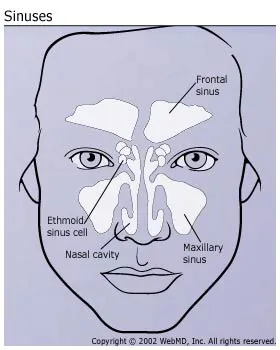Sinuses are air-filled cavities (spaces) located in your forehead, cheekbones, and behind the bridge of your nose. The sinuses produce a thin mucus that drains out of the channels of the nose. When a sinus becomes inflamed, usually as the result of an allergic reaction, a tumor, or an infection, the inflammation will prevent the outflow of mucus and cause a pain similar to that of a headache.
Sinus Headaches Symptoms
Sinus headaches are associated with a deep and constant pain in the cheekbones, forehead, or bridge of the nose. The pain usually intensifies with sudden head movement or straining. The pain is usually accompanied by other sinus symptoms, such as nasal discharge, feeling of fullness in the ears, fever, and facial swelling.

Whether your headache symptoms can actually be attributed to the sinuses will need to be determined by your doctor. If your headache is truly caused by a sinus blockage, such as an infection, you will likely have a fever. CT scans or MRI along with a physical exam are usually conducted to determine if there is a blockage in your sinuses.
Sinus Headache Treatment
Treatment of sinus headaches is usually directed toward symptom relief and treating the infection. Treatment might include antibiotics for the infection, as well as a short period of antihistamines (such as Benadryl) or decongestants (such as Sudafed) to treat the symptoms. If you take decongestants, but do not have a true sinus headache, the medication could make your headache worse. Be sure to see your doctor before taking any medications.
Other drugs to treat sinus infections include pain relievers and vasoconstrictors (to decrease nasal congestion). If the pain continues after using pain relievers, corticosteroids may be prescribed to further decrease the inflammation. When an allergen is causing the sinus flare-ups, preventive allergy therapy is often needed.
Decongestant medications can be used to relieve headaches associated with sinus infections. Decongestants help relieve headache symptoms because they constrict blood vessels that cause headache pain. However, decongestant use can be habit-forming. If your headaches seem to be relieved by decongestants but you do not have a sinus infection, you may actually have a migraine or tension headache, which require specific treatment.
Allergies and Sinus Headaches
It is a misconception that allergies cause sinus headaches. However, allergies can cause sinus congestion, which can lead to headache pain. If you have allergies, the treatment for your allergy will not relieve your headache pain. The two conditions generally must be treated separately. See your doctor to ensure proper treatment.
Source : http://www.webmd.com/

1 comments:
i think my right frontal sinus was blocked...i felt pain from that side and headache. it started when the weather turned colder. got my right eye teary also. gosh
Post a Comment